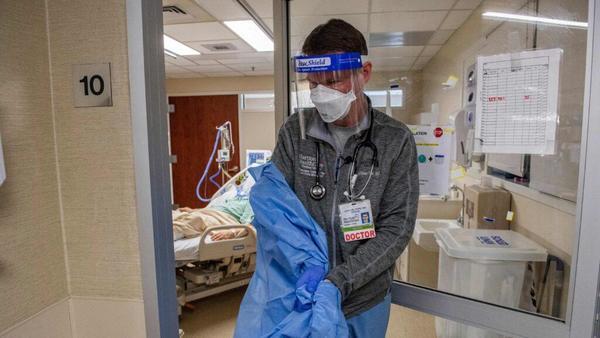
Keeping Your Cool as a Crisis Healthcare Worker
Being a nurse can be difficult. Staying calm amid chaotic environments, long and demanding schedules, and the rotation of patients is a skill that can be hard to cultivate and even more difficult to utilize consistently. Unfortunately for crisis nurses, providing crisis care can be even more grueling than traditional healthcare roles.
Thankfully, being a crisis healthcare worker doesn’t mean that one has to constantly feel stressed, frantic, and overwhelmed. There are practices, techniques, and strategies that one can take advantage of to cultivate a sense of balance and preparedness as a crisis healthcare worker. Understanding these tips can help provide one with the proper guidance to easily navigate the havoc of providing crisis care.
Here is how to keep your cool as a crisis healthcare worker.
Steer Clear of “Decision Fatigue”
Decision fatigue is a phenomenon that is becoming increasingly common in the workforce of a variety of industries. Caused by a combination of being exhausted, hungry, and overwhelmed by the process of decision-making, decision fatigue is characterized by a sense of weariness that makes it difficult for individuals to make decisions.
In the realm of crisis care, making accurate split decisions can have profound consequences on the health outcomes of those being treated. Accordingly, crisis healthcare workers must avoid decision fatigue at all costs to ensure that they’re able to make good decisions and perform their duties to the best of their abilities.
Thankfully, decision fatigue isn’t an experience that all crisis healthcare workers are doomed to experience regularly. Ways to avoid the experience of decision fatigue include avoiding thinking too deeply about inconsequential decisions, consistently getting an adequate amount of rest, and referring to the input of others for important decisions. By taking advantage of these key practices, crisis healthcare workers can avoid decision fatigue and stay calm amid stressful crisis care situations.
Practice Breathing During and Outside of Work
We’re all familiar with the calming effects of taking a deep breath when we feel overwhelmed. While one deep breath alone is better than nothing, cultivating a practice of deep breathing can make it easier to stay calm and collected as a crisis healthcare worker in stressful situations.
Cultivating a breathing practice both during work and outside of it can make it easier to control one’s emotional state and find a sense of calm when one needs to. A key facet of meditation is the practice of learning to control, temper, and adjust one’s breathing. As such, becoming an avid meditator outside of work can help one develop some of the deep-breathing skills necessary to calm down amid chaos.
The more adept crisis healthcare workers become at utilizing breathing techniques to relieve stress, lower one’s heartrate, and focus, the more they will be able to keep their cool during frenzied scenarios. As such, any crisis healthcare worker intent on increasing their ability to stay mentally collected during work should strive to cultivate a consistent deep-breathing practice.
When In Doubt, Refer to Protocols
In healthcare — along with many other fields such as aviation — protocols are a guide that expresses how workers should appropriately respond to various situations. When it comes to crisis care, having a thorough, encyclopedic knowledge of a range of protocols can make it easier to provide exceptional care and increase the chances of a patient experiencing positive health outcomes.
When people find themselves in a stressful or overwhelming situation, it can sometimes be difficult to think clearly. Unfortunately for crisis healthcare workers, their ability to think clearly and make the right decisions can greatly impact a patient’s life. This being the case, referring to protocols can ensure that crisis healthcare workers are never left incredulous and unable to make the right choices.
Becoming a scholar of protocols can help crisis healthcare workers ensure that they’ll be able to adequately deal with any medical scenario they face. In addition to being more knowledgeable, having a thorough command of protocols can provide crisis healthcare workers with a greater sense of preparedness that makes it easier to be calm in the face of arduous events and situations.
Have a Space to Unload Emotional Baggage
As a crisis healthcare worker, one will have experiences that are overwhelming, disturbing, and difficult to process. While it may seem like it’s one duty to always be stoic in the face of these experiences, holding these memories inside without expressing them can affect one in many negative ways.
When one is feeling the effects of overwhelming experiences, it can affect one’s ability to sleep adequately and manage stress. Accordingly, it’s vital that crisis healthcare workers have a space outside of work to unload emotional baggage and process difficult experiences related to their roles.
Whether one speaks to a professional counselor, writes a daily journal, or confides in family, unburdening oneself from the weight of trying experiences is key to staying emotionally intelligent and staying calm. As such, finding an outlet to express oneself is an important part of cultivating a sense of coolness as a crisis healthcare worker.
Crisis Healthcare Workers Are Capable of Staying Calm and Collected
Though being a crisis healthcare worker comes with its fair share of difficulties and overwhelming experiences, staying cool, calm, and collected while on the job is attainable for anyone who puts effort into cultivating these states.
By steering clear of decision fatigue, practicing breathing during and outside of work, referring to protocols, and having spaces to unload emotional baggage, crisis healthcare workers can learn to keep their cool amid any chaotic situation. While the role can be difficult, crisis healthcare workers can rest assured that they are doing amazing work that has a profoundly positive impact on the lives of the patients they treat.